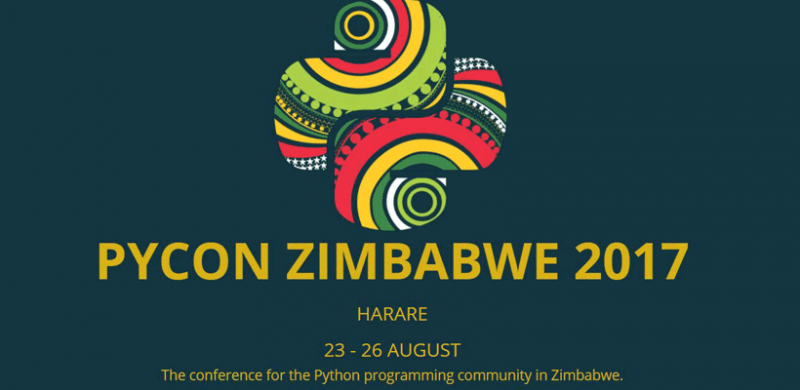
The four-day conference that aims to increase the visibility of developers by bringing together students, professionals, experts, and enthusiasts who wish to share their knowledge and passion about Python and related technologies.. It brings together people of different knowledge and skill levels in Python. Talks, tutorials, and coding exercises are conducted during the conference to share the knowledge around the people. They also host Django girls – a free workshop hosted during the conference, which is aimed at empowering girls through Python. PyCon and ZimboPy work together closely during this workshop to teach girls how to code.
PyCon Zimbabwe is organized by volunteers and python enthusiasts from the python programming community in Zimbabwe. PyCon Zimbabwe 2017 which was held from the 23rdto the 26th of August
The first PyconZim was held from 24th – 25th November 2016, at the Zesa National Training Centre. It brought delegates and speakers from the USA, South Africa, Namibia, and Zimbabwe. The second edition of PyConZim is also expected to bring speakers from Africa and the rest of the world and is expected to run longer as we have added two more days. It will also be held at the ZESA National Training Centre from the 23rd – 26th August 2017.
On the 23rd, PyCon held their first day which featured a workshop called Django Girls. On the 24th, the second day of PyConcommenced at ZESA National Training Center in Harare.
AchimMunene had a talk on Artificial intelligence, uses of artificial intelligence and the different ways to implement artificial intelligence in different programming languages. He spoke about how AI can be done in a variety of programming languages like JAVA, however, it is easier to do it in Python as the language has a wide range of resources for the field.
Apart from resources, Python has one of the fastest growing communities locally so it would be a good programming language to start with. Achim then further shared some of the concepts that you might want to get familiar with before starting to make a major AI. Such stuff included mathematics, neural science, and machine learning.
One interesting thing that he mentioned was that as a person, you would need to understand people and have ethics. So, when making AI, for it to be considered good especially if it will interact with people, the maker has to understand people in order to make a machine behave like one. The other important thing is to have ethics.
As we have seen from debates going on between high profile individuals from tech industry like Elon Musk and Mark Zuckerberg, AI can quickly get out of hand if it is left to be. This heated topic sparked a short discussion during the conference but that was something that would be left for another conference. However, having good ethics is key to making sure how to at least do your best to control your AI since you’ll know what lines not to cross.
TendaiMarengereke, a lecturer at Harare Institute of Technology, shared some insights that he has come across when dealing with the adoption of programming languages like Python in Universities. From the survey carried out by Techzim 2 months ago, he outlined that Python was one of the top programming languages being used by developers in Zimbabwe. Even though it wasn’t number one. Tendai carried out his own research to dig deeper into the subject.
He reached out to some universities to see which programming languages they were using and what exactly they were using them for. From the ones that did respond, he found that some are using the language for an Introduction to programming course while others are taking it further by implementing it in AI as Achim outlined earlier.
Despite this, some universities haven’t added the programming language to their curriculum. He pointed out that there are a lot of steps that have to be taken before a programming language like Python is added to the curriculum because the chain of command is large and sometimes things just go back and forth.However, Tendai shared that Python is seeing fast adoption among university students from HIT as a respectable number of them have used it for their projects this year.
Jessica Upani from Namibia later gave a talk on organizing conferences for learners and how she has helped make them successes in her home country. Jessica shared her experience of attending a conference and how it got her started on the path to building one for her community. She organized 2 conferences for learners and did one for adults. From those, she discovered that each type of conference has its requirements in respect to design, expectations, activities and the reason for attendance.
She mainly focused on how to organize a successful conference for kids around 10 years of age by making sure that the actual conference doesn’t just have talk. Kids will need a break here and there to keep them engaged and learning. Apart from that, she also shared that such type of conferences is important for the younger generation as they give them a chance to explore what is possible in the tech industry at a young age and then keep nurturing the talent if it is there or start a new adventure if it is not.
Jose Machava from Mozambique presented on more technical subjects like deploying your Django apps to an online platform called Heroku and KundaiGwatidzo who presented on what is GIT and a brief tutorial on how to use it without all the frustration that many have seen.
PyCon seems to be less about holding a big lavish conference but more about getting people from different walks of life and continents for that matter into one room. In this room, knowledge from experiences of these developers is shared and that is how collaborations start, just by sharing knowledge.
Article by Nelson Madzima.





